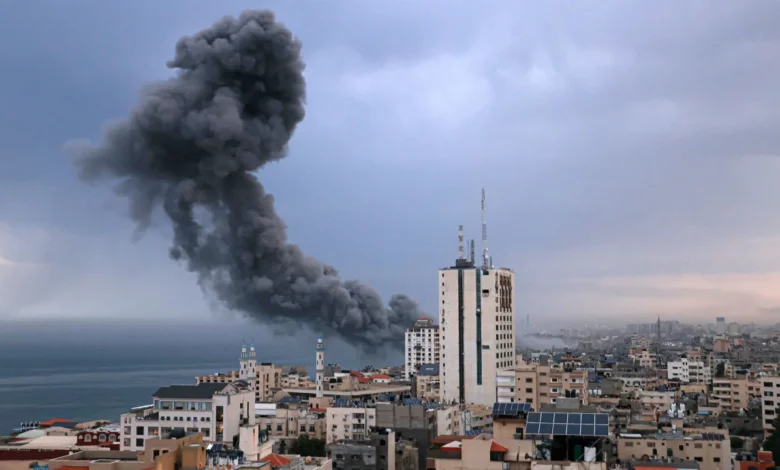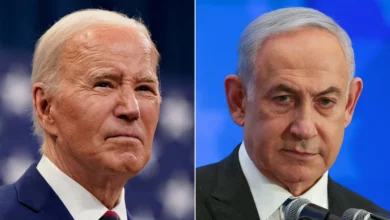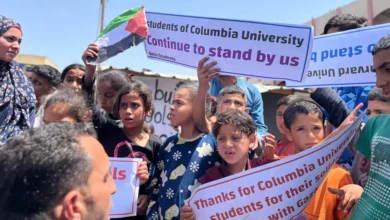
The trucks entered through the Rafah crossing, the only entry point to Gaza not controlled by Israel, as seen by CNN’s team on the Palestinian side of the border. The crossing closed quickly after 20 trucks went through.
People on the Egyptian side of the border – where aid organizations had waited for days to be given the green light – were jubilant as the crossing opened, celebrating with ululations and chants.
According to Egyptian authorities at the Rafah crossing, 13 trucks were carrying medicine and medical supplies, five were carrying food and two trucks had water.
European commission chief, Ursula von der Leyen, called it an “important first step that will alleviate the suffering of innocent people.”
However, while these supplies are desperately needed, aid workers say they are a fraction of what’s required for the 2.2 million people crammed into Gaza under a blockade imposed by Israel and Egypt.
Martin Griffiths, United Nations under-secretary-general for humanitarian affairs and emergency relief coordinator, said the delivery followed “days of deep and intense negotiations,” adding that the humanitarian situation in Gaza “has reached catastrophic levels.”
Conditions have grown more dire each day, with hospitals on the verge of collapse and Gazans fast running out of food, water and other critical supplies amid near-constant bombardment by Israel.
World Health Organization (WHO) director general Tedros Adhanom Ghebreyesus stressed that “the needs are far higher” than the aid people in Gaza have received.
The WHO said it is working with the Egyptian and Palestine Red Crescent societies to ensure the safe passage of supplies to health facilities, adding shortages have left hospitals in Gaza at “breaking point.”
A lack of fuel is also a concern. Wael Abu Mohsen, head of communications for the Palestinian side of the Rafah crossing, told Saudi state media Al Hadath TV Saturday that fuel was not delivered, “despite fuel supplies running dangerously low at hospitals and schools in Gaza.”
Israeli Defense Forces (IDF) spokesperson Rear Admiral Daniel Hagari confirmed that none of the trucks were carrying fuel.
The arrival of aid comes as world leaders gathered in Cairo, Egypt, for the Cairo Peace Summit on Saturday.
Egyptian President Abdel-Fattah El-Sisi initiated the peace summit on Gaza in a bid to de-escalate the situation and protect civilians in the enclave. Representatives from 34 countries, including the Middle East, Africa and Europe, and the UN are in attendance, according to organizers.
Two hostages released
On Friday, two American hostages were released from Gaza, the first since Hamas’ October 7 attacks – but their freedom also deepened questions about the fate of other hostages should Israeli troops go into the enclave. The IDF said Saturday that it believes 210 people are being held hostage in Gaza.
Hamas, the Islamist militant group that controls Gaza, handed over the hostages at the border on Friday, with Judith Tai Raanan and her 17-year-old daughter Natalie Raanan now on their way to be reunited with loved ones.
For their family, the release marked the end of a nightmare that began on October 7 when Hamas members carried out the worst massacre of Jews since the Holocaust, killing more than 1,400 people and abducting scores back to Gaza.
So far at least 4,127 people have been killed in Israel’s retaliatory strikes on Gaza, according to the Hamas-controlled Palestinian Ministry of Health in Gaza, including hundreds of women and children – even as Israel claims it is only targeting Hamas locations.
“We are ready to start this incredible journey of healing and trauma relief for her,” said Ben Raanan, Natalie’s brother.
But, he pointed out, the nightmare continues for countless others.
“There are families all over in Gaza and in Israel that are experiencing a loss that I can’t even imagine,” he said.
Many of those Israeli families attended a ceremony in Tel Aviv on Friday, where a Shabbat dinner table was laid with 200 empty place settings to represent the hostages. Shabbat, a holy day of rest and reflection each week, is often a time when Jewish families gather for meals and prayer.
A Hamas spokesperson claimed on Friday that the two US hostages had been released “for humanitarian reasons” and to “prove to the American people and the world” that claims made by the United States government “are false and baseless.”
And while the release has been welcomed by world leaders, including those in the United States, United Kingdom and France, those in Israel have voiced skepticism about Hamas’ motivations and have promised to continue their blistering counterattack.
“Two of our hostages are home. We will not ease the effort to bring back all abductees and those missing. Simultaneously, we keep fighting until a victory is reached,” said Israeli Prime Minister Benjamin Netanyahu in a statement on social media on Friday.
Maj. Doron Spielman, a spokesperson for the Israel Defense Forces (IDF), told CNN on Friday it was an “absurd” attempt by Hamas to “gain more world favor by playing that humanitarian card.”
Others have suggested the release could be an attempt by Hamas to buy time, as speculation swirls of a potential ground incursion by Israeli forces, who have massed by the border and warned Palestinians to evacuate northern Gaza.
Israeli officials have not publicly shared details about their plans, besides saying the goal is to eliminate Hamas and its infrastructure, much of which consists of heavily reinforced tunnels underground the densely populated cities.
“Hamas is really under great pressure, and it is trying every trick in the book, and they will try many more as we go along, to stop the Israeli maneuver into the Gaza Strip,” said Rami Igra, former division chief of the hostages and MIA unit with the Mossad, Israel’s intelligence service.
“They are trying to postpone this. They are trying to ease the pressure on them, and they will use anything they can in order to get a ceasefire,” he added.
The US and its allies have not tried to discourage this kind of ground assault – but they have urged Israel to be strategic and clear about its goals in the case of an incursion, warning against a prolonged occupation and emphasizing civilian safety, US and Western officials told CNN.
Aid trucks waiting at border
Yet every day the civilian deaths in Gaza mount, fueling anger in the Middle East and beyond.
The enclave, which was already under a blockade imposed by Israel and Egypt for the past 17 years, became further isolated after the latest war broke out and Israel declared a complete siege.
The electricity blackout and ban on fuel imports have had “devastating consequences” on the healthcare system and access to clean water, warned the UN’s Office for the Coordination of Humanitarian Affairs (OCHA) on Saturday.
It added that about 1.4 million people had been displaced in Gaza – more than 60% of the entire strip’s population of 2 million.
More than 544,000 people are staying at UN-designated emergency shelters “in increasingly dire conditions,” with many at risk of infectious disease due to unsafe water, the OCHA added in its statement.
While Egypt agreed earlier this week to let the first aid trucks into Gaza through the Rafah crossing – the only entry point into the enclave not controlled by Israel – the opening was beset with delays, frustrating aid organizations waiting to be given the green light.
But the 20 trucks that entered Gaza on Saturday, while desperately needed, aren’t nearly enough for the scale of the crisis
“We need to build up to the 100 trucks a day that used to be the case of the aid program going into Gaza,” UN relief chief Griffiths told CNN. “We need to be able to have the assurance that we can go in at scale everyday – deliberately, repetitively and reliably.”
Tamara Alrifai, the director of communications at the UN’s relief body for Palestinian refugees, echoed this sentiment, saying: “What is needed is a continuous flow of aid. This is not about a one-off, sending 20 trucks and then nothing.”
CNN’s Hafsa Khalil, Lina El Wardani, Chris Liakos, Caroline Faraj, Lauren Kent, Niamh Kennedy, Clarissa Ward, Rhea Mogul, Christian Edwards, Alex Marquardt, Kaitlan Collins, Oren Liebermann, Michael Conte, Sana Noor Haq, Eva Rothenberg, Natasha Bertrand, Katie Bo Lillis, Kareem El Damanhoury, Donald Judd, Mariya Knight and Tamar Michaelis contributed to this report.




